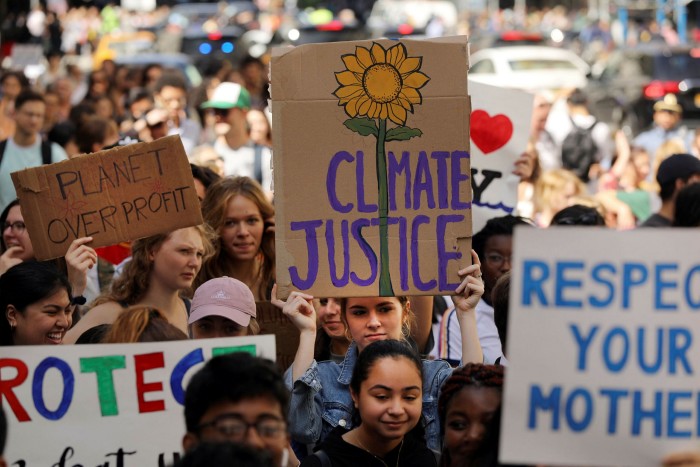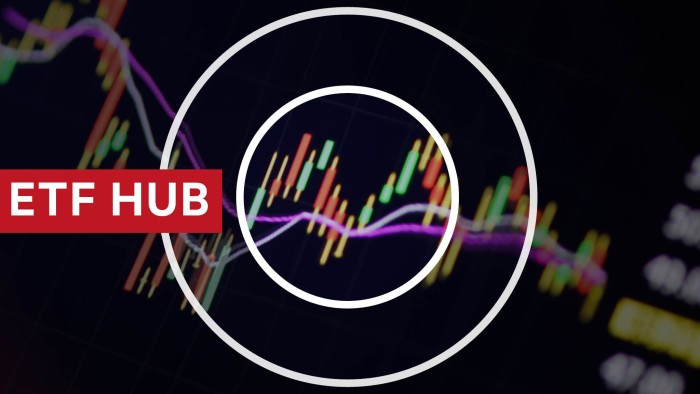ESG surges as investors search for better corporate citizens

Simply sign up to the Exchange traded funds myFT Digest -- delivered directly to your inbox.
Exchange traded funds that emphasise good environmental, social and governance factors have surged in popularity, as investors look to boost their returns and push companies to become better corporate citizens.
As of July 30, ESG-themed ETFs had pulled in a record-setting $38bn in new money for the year and topped $100bn in total assets for the first time, according to the most recent available data from ETFGI. This rapid growth mirrors the huge asset gains in sustainable mutual funds, and the trend is showing no signs of slowing.
Matteo Andreetto, head of State Street Global Advisors’ SPDR ETF business, predicts ESG ETFs and index mutual funds could reach $1.3tn by 2030.
While ESG funds were gaining steam before this year, he believes the pandemic has put a spotlight on the need to improve issues such as income inequality, diversity and climate change. “The people who were really getting the worst [effects of the pandemic] were the lowest paid people,” he said.
In Europe, where ETFs are primarily used by institutional investors, the growing influence of the UN Principles of Responsible Investing has also played a major role in ESG adoption, he said. The PRI, which calls on investors to publicly commit to “incorporate ESG issues into [their] investment analysis and decision-making processes”, counts more than 3,000 investors and fund managers among its ranks. “Many asset owners and investment firms are clearly placing greater emphasis on ESG issues than before,” said Mr Andreetto.
With mounting evidence that ESG does not hurt performance, a growing number of investors are switching their core passive holdings over to ETFs that track sustainable indices.
But these funds are not without their limitations. One snag with sustainable indices is they rely on rating agencies like MSCI to grade companies on their ESG performance, and those scores are largely subjective.
“Even top companies may have very different ratings, depending on who the index provider or rating agent is,” said Andrew Craswell, head of European ETF relationship management at Brown Brothers Harriman. “So I think providers are looking at how they create more of a uniform approach.”

There are no regulatory requirements for companies disclosing ESG data, so the rating agencies must rely on third-party data sources and proprietary information to try and paint a complete picture of a company. Inevitably, some ESG funds will include some embarrassing misses, such as Boohoo, a UK fashion company that was rocked by allegations over its working conditions.
Groups like the Global Reporting Initiative, the Sustainable Accounting Standards Board and the World Economic Forum all advocate greater standardisation of ESG disclosures. However, even if companies all disclose the same information, there is still a problem in how that information is interpreted, said Michael John Lytle, chief executive of Tabula Investment Management.
It is one thing to measure environmental metrics like emissions, but social and governance topics are not as easily quantified. Mr Lytle said: “There’s going to be a huge amount of argument amongst institutional investors about ‘how do you define ESG?’” “I don’t think that there is an easy way to translate all of this social activation into investment through passive products today,” he added.
Still, it does not appear as if any of this will be likely to slow the momentum of ESG ETFs. A 2019 survey from Brown Brothers Harriman found nearly one in five global investors expected to invest between 21 and 50 per cent of their assets in ESG ETFs.
Inside ETFs

The FT has teamed up with ETF specialist TrackInsight to bring you independent and reliable data alongside our essential news and analysis of everything from market trends and new issues, to risk management and advice on constructing your portfolio. Find out more here
Invesco surveyed European institutional investors earlier this year and found 45 per cent have plans to invest more in ESG ETFs. This is welcome news for companies with large passive investing units, but it presents a problem for active managers that have keyed in on ESG as an area where they can claw back market share from indexers.
Still, active managers are not ready to concede defeat without a fight. “I wouldn’t be comfortable betting on the investment implications of a standalone rating from any of the rating providers,” said Valerie Grant, senior portfolio manager of responsible investing at active manager AllianceBernstein. “Quite frankly, if you look at other sectors of the asset management ecosystem that are ratings-dependent, [such as] the credit markets . . . They got it wrong in the great financial crisis.”

Comments